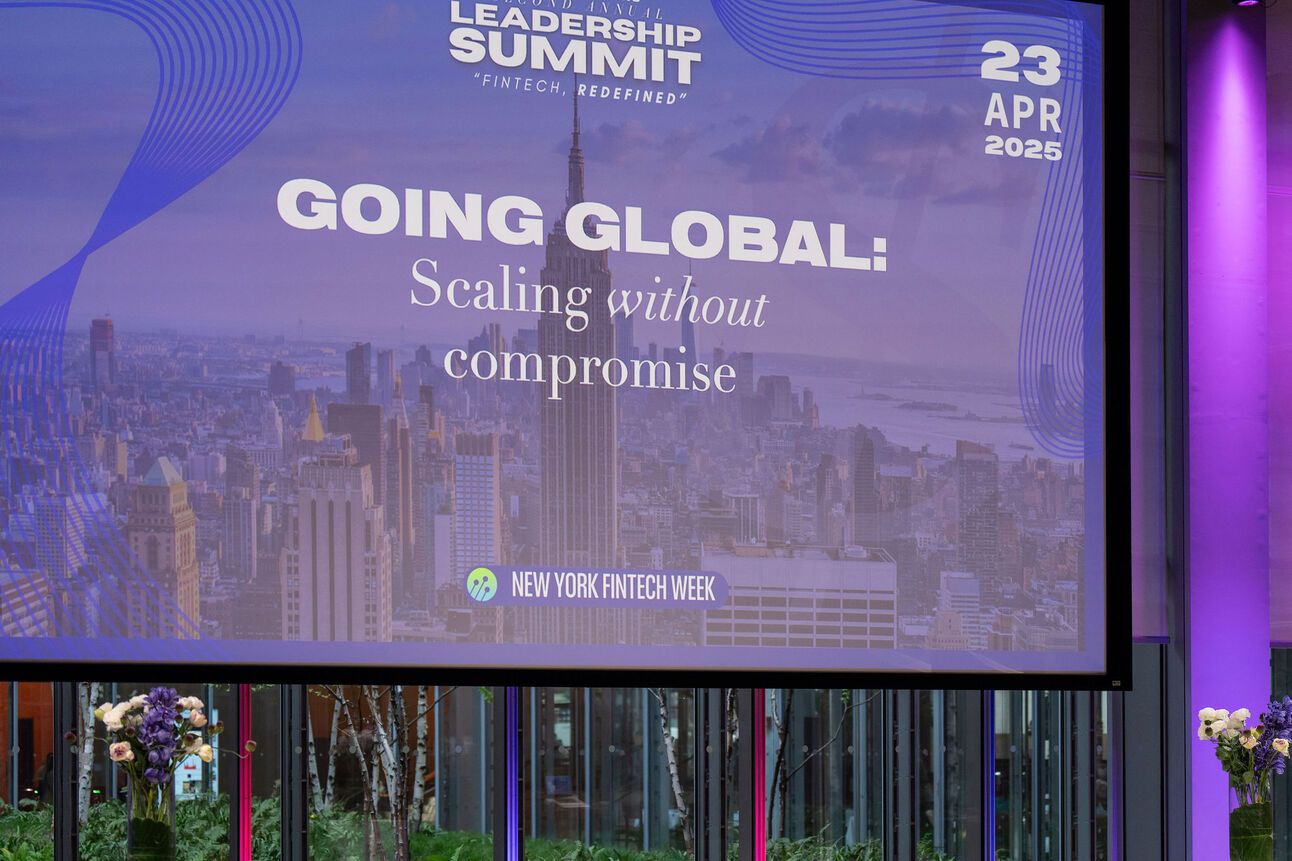Hi, fintech fam 💜
Writing you from 37,993 feet en route to SF for The Fintech Summit hosted by Fiat Growth, where I’ll be speaking and recording a live episode of Fintech Mavericks with my co-host Drew Glover.
Season 2 drops next Wednesday—new format, big guests. Subscribe on Apple or Spotify to catch it first!
While I’m in town, I’m hosting a private happy hour for members of The Academy of Fintech. If you’re in SF and want to join, you’ll need to apply for a Founding Membership.
This is also the unofficial kickoff to our Leadership Summit coming this October during Tech Week SF. If you want to join us in shaping the agenda, this is your chance.
Next week, I’m bringing together 12 executive women for a roundtable at Chief to help shape our Emerald Climate Fintech Summit, where capital meets climate leadership.
Want to help shape the Summit? Apply here to attend the Chief Clubhouse in NYC.
Did I mention how much I love building with you?
Now, let’s get into today’s column.
INNOVATION
Why Every Fintech Needs a Global Strategy—And the Smartest Way to Build One

Going Global panel during the Fintech Is Femme Leadership Summit at the Times Center. April 23, 2025, New York City.
When running a fintech company, being the best in your city—or even your country—isn’t enough. Winning in 2025 and beyond means thinking bigger. It means thinking global.
From New York to Silicon Valley to Sydney and Berlin, fintech leaders are redefining growth by going global—and in doing so, they’re shaping the future of finance.
Data backs this up. According to the World Economic Forum’s Future of Global Fintech report, fintech companies with international strategies grow customers at rates topping 50%, significantly outpacing their local-only peers. More than half of those companies identified strong global customer demand as the primary driver of that growth.
At the Fintech Is Femme Leadership Summit in April, Melissa Magner, Head of Legal & Corporate Secretary, Versana, moderated a panel featuring three executives who’ve done just that:
Jinal Shah, Chief Customer Officer at ZIP
Flora Zhang, Director of Business Ops at Brex
Tanja Aschebeck, Partner, Head of Financial Services at Osborne Clarke
The panel, sponsored by Osborne Clarke, focused on how to scale globally without compromising mission, product integrity, or company identity.
Going Global: What It Takes

ZIP’s story shows what it looks like to seize an opportunity.
Born in Australia, ZIP saw U.S. market potential early and acquired Quadpay to fast-track its entry. “Buy now, pay later” was already deeply embedded in Australian consumer behavior, and the U.S. was just warming up.
For Shah, the math was clear: “Australia’s population is just 20 million—about the size of New York,” she said. “So if you’re looking at TAM and market maturity, the U.S. was the obvious next step.”
For Brex, the journey looked different. With customers already spending globally, Zhang and her team reverse-engineered demand by analyzing client calls.
“Every time a customer mentioned a country, we tagged it,” she explained. “Eventually, we had a heatmap of global demand—real, organic signals—and used that to prioritize expansion markets.”
Start with the customer signal by tagging every country mentioned on prospect calls, tallying the mentions, and ranking them.
Customer data, not gut feeling, is the key to knowing where to go next.
From there, Brex leaned into a partner-first model.
“We chose partnerships with established local financial institutions instead of getting our own licenses initially,” said Zhang. “It helped us move faster, gain local insight, and stay flexible amid changing regulation.”
And throughout it all, compliance was baked into Brex’s DNA.
“From tax tracking to reporting, everything was built for local nuances,” she added. “We didn’t bolt on compliance. We built with it.”
Timing Is Everything

So, when do you know it’s time to expand?
For ZIP, it was a combination of board pressure, product-market fit, and the need to demonstrate growth post-acquisition.
“Once the acquisition closed, we had to show results quickly,” Shah said. “That meant making critical hires—sales, legal, growth—before the ink was dry.”
Zhang emphasized the importance of strategic timing tied to demand. “After the pandemic, companies were hiring globally fast. We saw our customers jump from 20 to 160+ countries almost overnight. That was our signal.”
Tanja Aschebeck, Partner and Head of Financial Services at Osborne Clarke, emphasized the importance of smart legal strategy early on. Her #1 tip? Start with the bank account.
“Before you even incorporate, start opening a bank account,” she said. “AML processes can delay everything. And don’t pick your HQ jurisdiction based on tax advantages alone—go where your customers are and where you can hire the right talent.”
She also warned against shortcuts: “Some regulators may seem faster or easier. But working with a high-reputation authority like BaFin in Germany becomes a quality seal. It can actually help you scale faster and more credibly.”
Regulatory hurdles can feel like roadblocks—but they’re often competitive advantages. Regulation is a feature, not a bug.
The more serious the regulator, the more trust you earn in the market.
How to Scale Without Losing Yourself

For all three leaders, staying true to your brand while adapting locally is the balancing act.
Brex uses what Zhang called a “global core, local flags” approach. “The product must work the same across regions—but customers can pay with Apple Pay in one country and WhatsApp in another. It’s about respecting behavior while maintaining consistency.”
It's not about one-size-fits-all. It's about one-core-fits-most, with room to flex.
ZIP had to manage more than product differences—it had to navigate a full brand transition.
“We rebranded Quadpay to ZIP after acquisition,” Shah said. “We underestimated the effort. Launch is just the beginning—how you sustain and grow that brand matters just as much.”
Her advice: Prioritize critical hires early. Think strategically about sequencing.
Bottom Line

Whether you’re a 10-person startup or a post-Series B rocketship, going global is a strategic growth play—and it’s a test of your fintech’s resilience, adaptability, and alignment to its mission.
The companies that win aren’t just the ones that move first—they’re the ones that move smart.
They listen to their customers, anticipate regulatory hurdles, and hire strategically. They know when to go fast—and when to pause and build a stronger foundation.
And in a world where capital is cautious and consumer trust is everything, global scale backed by local depth is a competitive advantage fintechs can’t afford to ignore.
Because as these leaders showed: going global isn’t just about taking your product elsewhere.
It’s about taking your purpose with you—and proving it can scale.
#SPONSORED
Turn AI Hype Into Business Impact
AI is more than just using ChatGPT.
It’s about understanding how the technology works—and applying it in practical ways to solve real business problems.
The AI for Business & Finance Certificate Program from Wall Street Prep + Columbia Business School Exec Ed helps you move beyond the hype.
You’ll demystify today’s most important tools and learn just enough Python to streamline workflows, automate tasks, and make smarter decisions.
No coding experience needed—you’ll get step-by-step guidance from world-class faculty.
👉 Save $300 with code SAVE300.
WTF ELSE?
Gen Z’s digital expectations force banks into innovation overdrive
Open banking to survive Trump, fintechs say
Alexa von Tobel has high hopes for 'fintech 3.0'
AI could make financial advice more equitable and resilient
Planning for 100-year lives: How fintech can reshape wealth for the longevity economy
Meet the women founders behind France and Southern Europe's fastest growing startups
I WANT IT, I GOT IT
🎧 Today’s Listen: Today’s throwback episode of Fintech Mavericks features Simon Taylor breaking down how storytelling powers strategy, why authenticity always beats hype, and what founders need to know when building in complex spaces like fraud, compliance, and infrastructure. Tune in to our podcast here.
🚀 Today’s Read: Last week, I wrote about why the intersection of climate, capital, and fintech isn’t just important—it’s where our industry must lead. The column also previews the next summit we’re building and how you can get involved. Read it here.
🧘♀️Today’s Self-Care: New hobby unlocked: pole dancing. This year, I’m all about pushing myself in new, physical ways—and let me tell you, pulling yourself up on a pole is no joke. I just graduated from intro to Level 1 (cue the bruises and surprise muscles I didn’t know I had). I’ve been taking classes at Everybody’s Nimble in Brooklyn and absolutely love it. If you’re curious, their intro class is on ClassPass.
FINTUNES
Providing us with the self-care and boundaries we need in an angelic song.

LET’S CONNECT
📰 Share this newsletter with a friend and start growing your network.
🔗 Connect with me on LinkedIn for daily insights on female leadership.
🤝 Grow your business through content & community by partnering with me.
📣 Promote yourself to 50,000 subscribers by sponsoring this newsletter.
🎤 Host an epic event by booking me as a speaker, moderator, or emcee.
📚 Increase your expertise by ordering your copy of my book, Fintech Feminists: Increasing Inclusion, Redefining Innovation, and Changing the Future for Women Around the World.
That’s all for now! See you Thursday!
Love,
Nicole 💜



